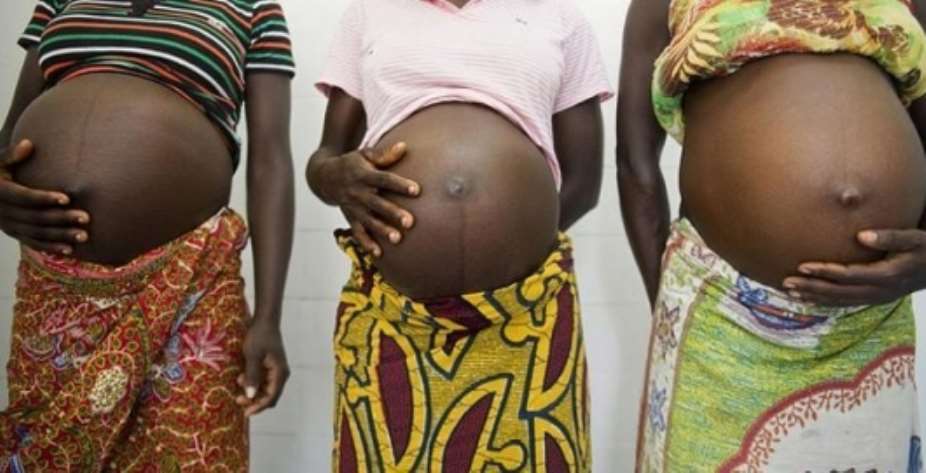Chief Executive Officer (CEO) of the Social Marketing Foundation, Alex Banful has urged government to aim at limiting the birth rate of Ghanaian families to two instead of three.
Ghana has aimed at a one family to three children target for the year 2020 but according to Mr. Bamfo, the average rate currently stands at 4.2.
Ghana to miss 2020 fertility ratio target
“In fact we should be aiming at a fertility rate of two. Three is what we aimed at for 2020, in 1994, when we revised the population policy we aimed at a fertility rate of three. We are three years away and we still have a fertility rate of 4.2 which means we are way off,” he said on the Citi Breakfast Show on Monday.
Mr. Banful made the remark on the following a proposal by the Executive Director of the National Population Council, Leticia Adelaide Appiah for government to restrict families to three children to ensure quality in human resource of the country.
“The way forward is to have a population policy implemented, the growth rate should be reduced and we have to talk about the quality of life,” she noted.
More education for women, family planning key
Mr. Banful on the Citi Breakfast Show said family planning and allowing girls to stay longer in school could be an answer to Ghana's population surge which is said to be increasing by astronomical margins.
“Family planning is the methodology for achieving that. So making sure there is access to family planning is key, not only for women, the men can also some, there are condoms and vasectomy for men. All the men who believe they have the children they have can also do vasectomy so that we can start bringing the population down. I'm sure you've seen the kiosk cities springing around the urban areas, it's because we don't have enough accommodation.”
“We need to build schools but if we can't control the input into our population system anytime we finish building the school, we won't have enough schools, if we build hospitals we won't have enough hospitals. So we need to control this. The Asain Tigers saw this; Indonesia, Malaysia, China, all of them saw this and decided that managing the population was going to be key to their economic development,” he added.
Mr. Banful also urged government to introduce role modeling schemes for girls to enable them stay longer at school.
“…We need to also have a lot of modeling for girls; the women who have made it in life could become role models for others girls so that people will look up to these and say they want to be like them. The girls are going to school but they are not staying in school. The thing is to get them to stay in school,” he added.
Population surge could affect economy
The Population and Housing Census pegged Ghana's total population by 28.21 million by 2016 while a United Nations estimates it to be 28.73 million as of August 20, 2017.
According to Leticia Appiah, Ghana has in the last 30 years, maintained an astronomical growth rate of 2.5; comparative to the global average of 1.5.
She said the development has negatively affected the country's economy and development.
She noted that if the situation persists without the appropriate policy to address it, the quality of life in the country will experience a sharp decline leaving very few people with the needed technical know-how of addressing various challenges in the country.
–
By: Godwin Akweiteh Allotey/citifmonline.com/Ghana
Follow @AlloteyGodwin





 Tuesday’s downpour destroys ceiling of Circuit Court '8' in Accra
Tuesday’s downpour destroys ceiling of Circuit Court '8' in Accra
 SOEs shouldn't compromise on ethical standards, accountability – Akufo-Addo
SOEs shouldn't compromise on ethical standards, accountability – Akufo-Addo
 Father of 2-year-old boy attacked by dog appeals for financial support
Father of 2-year-old boy attacked by dog appeals for financial support
 Jubilee House National Security Operative allegedly swindles businessman over sa...
Jubilee House National Security Operative allegedly swindles businessman over sa...
 Nobody can order dumsor timetable except Energy Minister – Osafo-Maafo
Nobody can order dumsor timetable except Energy Minister – Osafo-Maafo
 Mahama wishes National Chief Imam as he clock 105 years today
Mahama wishes National Chief Imam as he clock 105 years today
 J.B.Danquah Adu’s murder trial: Case adjourned to April 29
J.B.Danquah Adu’s murder trial: Case adjourned to April 29
 High Court issues arrest warrant for former MASLOC Boss
High Court issues arrest warrant for former MASLOC Boss
 Align academic curriculum with industry needs — Stanbic Bank Ghana CEO advocates
Align academic curriculum with industry needs — Stanbic Bank Ghana CEO advocates
 Election 2024: We'll declare the results and let Ghanaians know we've won - Manh...
Election 2024: We'll declare the results and let Ghanaians know we've won - Manh...
